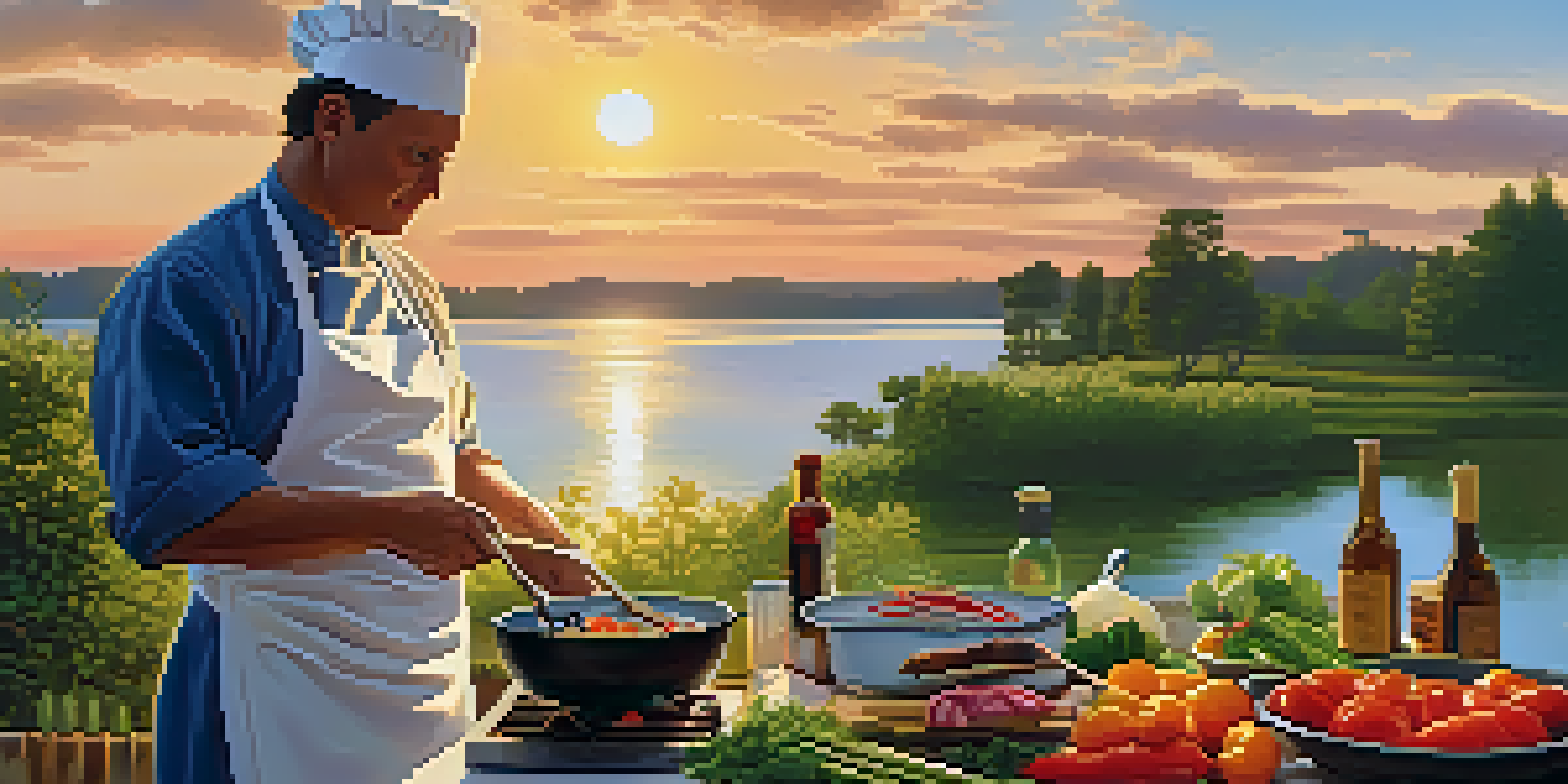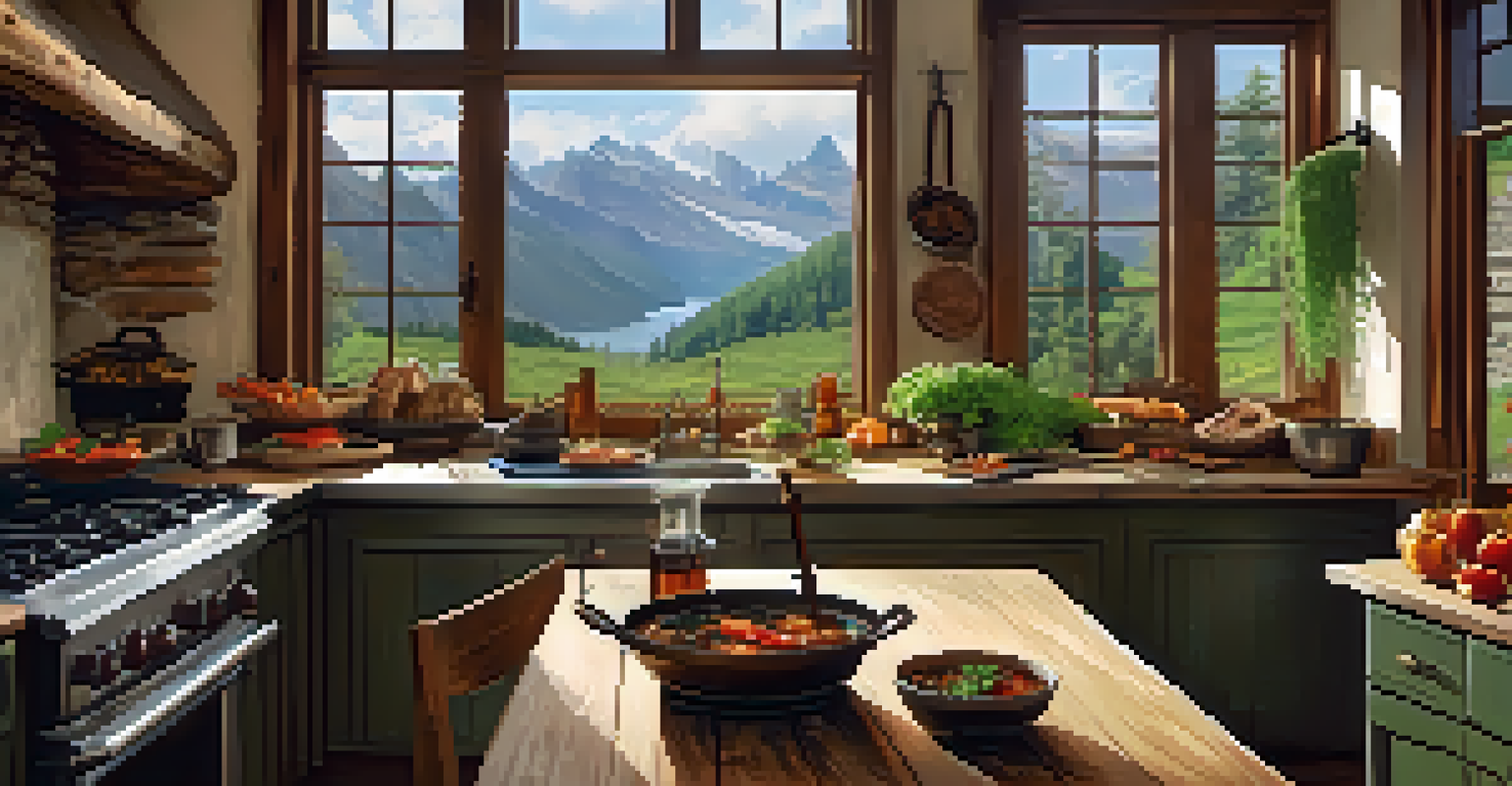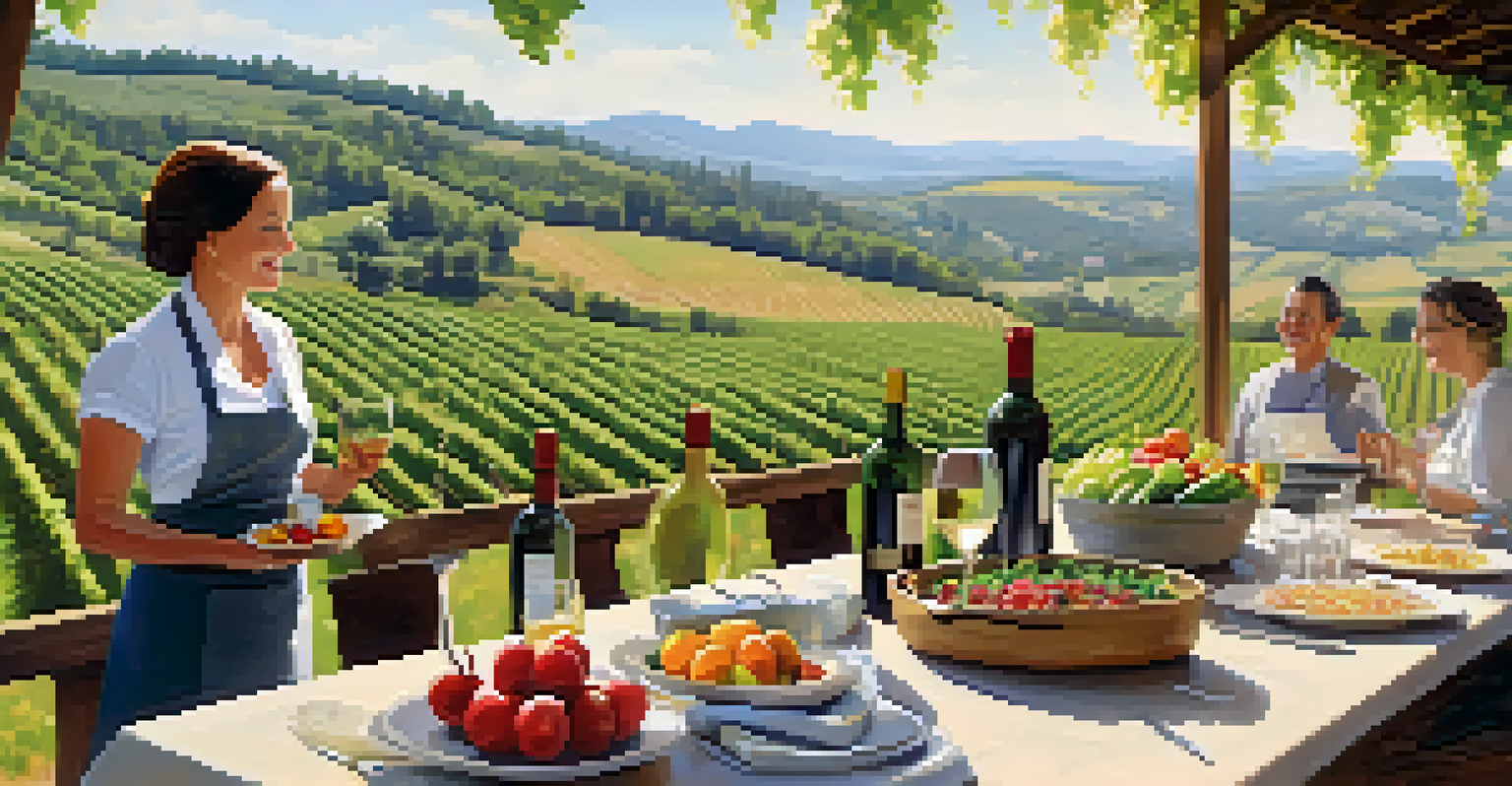Top 10 Picturesque Locations for Outdoor Cooking Classes

1. Serene Lakeside Retreats for Culinary Learning
Imagine the gentle lapping of water against the shore as you chop fresh vegetables for your next dish. Lakeside retreats offer not just a beautiful backdrop, but also a peaceful ambiance that enhances the cooking experience. With the aroma of nature surrounding you, every meal feels like a celebration.
Cooking is like love. It should be entered into with abandon or not at all.
Many lakeside venues provide facilities for both cooking and dining, allowing you to savor your culinary creations with a view of the water. Picture enjoying a freshly grilled fish while watching the sunset reflect on the lake's surface. This connection to nature can elevate even the simplest of meals.
In addition, these spots often have expert chefs who can guide you through the cooking process, sharing tips and tricks that you can take home. Combine their expertise with the tranquil setting, and you'll find that you not only learn to cook but also create lasting memories.
2. Majestic Mountain Locations for Unique Cooking Classes
When you think of cooking classes, mountains might not be the first image that springs to mind. However, cooking in the great outdoors amidst towering peaks can be a thrilling experience. The crisp air and stunning vistas inspire creativity, making it easier to experiment with flavors and techniques.

Many mountain retreats offer cooking classes that utilize local ingredients, such as fresh herbs and vegetables from nearby farms. This farm-to-table approach not only supports local agriculture but also enhances the flavor of your dishes. Imagine a hearty stew made with fresh ingredients while surrounded by the sights and sounds of nature.
Culinary Classes Amid Nature's Beauty
Outdoor cooking classes in serene locations enhance the culinary experience by combining fresh ingredients with stunning natural backdrops.
Moreover, these locations often have cozy cabins or lodges where you can unwind after a day of cooking. Sharing your culinary successes around a fireplace with fellow food enthusiasts makes for a perfect end to a day spent in the mountains.
3. Coastal Escapes for Seafood Cooking Adventures
Coastal locations provide an incredible setting for outdoor cooking classes focused on seafood. With the ocean breeze and the sound of waves crashing, there's no better place to learn how to prepare fresh catches of the day. From grilling fish to making ceviche, the options are endless.
Food is our common ground, a universal experience.
Many coastal cooking schools emphasize sustainability, teaching participants how to source and prepare seafood responsibly. This not only enhances your culinary skills but also instills a sense of environmental consciousness. Picture yourself cooking a seafood paella with the ocean as your backdrop—it's a recipe for unforgettable memories.
Additionally, the opportunity to connect with local fishermen can offer unique insights into the seafood industry. Learning the best practices of sourcing seafood adds depth to your cooking experience and connects you to the community.
4. Charming Vineyard Settings for Culinary Classes
Vineyards provide a picturesque backdrop for outdoor cooking classes, combining the art of cooking with the enjoyment of wine. The rolling hills and rows of grapevines create an idyllic atmosphere that inspires relaxation and creativity. Imagine pairing your culinary creations with a glass of wine from the very vineyard you’re cooking in.
Many vineyard cooking classes focus on seasonal ingredients, encouraging participants to incorporate local produce into their dishes. This not only allows for a fresh and vibrant menu but also connects you more deeply to the region's agriculture. Pairing food with the right wine can elevate your meal and your cooking skills.
Hands-On Learning from Local Experts
Many cooking retreats feature expert chefs who provide hands-on guidance, enriching your skills while fostering a deeper connection to the food.
Furthermore, these classes often include wine tastings, turning a cooking session into a full sensory experience. Learning what flavors complement each other while sipping on exquisite wines adds a delightful twist to your culinary adventure.
5. Rustic Farm Settings for Hands-On Cooking Experiences
There’s something special about cooking in a rustic farm setting. Surrounded by open fields, farm animals, and fresh produce, you’ll feel a deep connection to the food you’re preparing. Many farm-based cooking classes emphasize hands-on experiences, allowing participants to pick their ingredients right from the garden.
This farm-to-table approach not only enhances the flavor of your dishes but also fosters a greater appreciation for where your food comes from. Imagine plucking ripe tomatoes from the vine and turning them into a delicious sauce—nothing beats that level of freshness. It’s a culinary experience that’s as educational as it is enjoyable.
Moreover, working alongside farmers can provide invaluable lessons about sustainable practices and the importance of local agriculture. This knowledge enriches your cooking and encourages you to make thoughtful choices in your own kitchen.
6. Scenic National Parks for Nature-Inspired Cooking Classes
National parks offer an incredible backdrop for outdoor cooking classes, combining the beauty of nature with culinary exploration. Picture yourself cooking over an open flame surrounded by towering trees and stunning landscapes. The serenity of the park enhances the cooking experience, inviting participants to focus on the flavors and techniques.
Many parks provide designated cooking areas equipped with grills and picnic tables. This allows you to immerse yourself in the experience, learning how to cook using traditional methods while surrounded by breathtaking views. It's a unique way to connect with nature and enhance your culinary skills.
Cultural and Historical Culinary Journeys
Cooking classes at historic sites not only teach traditional recipes but also immerse participants in the cultural significance behind each dish.
Additionally, these classes often incorporate local ingredients, emphasizing the importance of cooking with what's available in the region. This not only supports local ecosystems but also encourages creativity as you adapt recipes to utilize seasonal produce.
7. Urban Rooftops for a Modern Culinary Experience
Urban rooftops transform the typical cooking class into a chic culinary experience. With cityscapes as your backdrop, you can enjoy both the excitement of the city and the art of cooking outdoors. The vibrant atmosphere can inspire innovation, making it the perfect setting for modern culinary techniques.
Many rooftop cooking classes focus on contemporary dishes, often incorporating global flavors and trendy ingredients. This fusion of traditional and modern cooking can lead to exciting culinary discoveries. Imagine preparing sushi rolls while overlooking the skyline—it's an experience that combines taste and aesthetics beautifully.

Rooftop venues often provide a social atmosphere, allowing participants to mingle and share their cooking experiences. This interaction fosters a sense of community and camaraderie, making for a fun and engaging culinary class.
8. Historic Sites for a Unique Culinary Journey
Cooking classes held at historic sites offer a fascinating blend of culture and cuisine. These locations provide not only a beautiful setting but also a rich historical context that can enhance your culinary journey. Imagine preparing traditional dishes using recipes that date back centuries, all while surrounded by the charm of history.
Many sites incorporate storytelling into their classes, sharing the significance of each dish and its connection to the culture. This adds depth to your cooking experience, transforming each meal into a narrative. Learning about the history behind your food can deepen your appreciation for the culinary arts.
Additionally, these classes often utilize traditional cooking methods, providing a hands-on experience that connects you to the past. It’s a unique opportunity to blend history, culture, and cooking in one memorable experience.